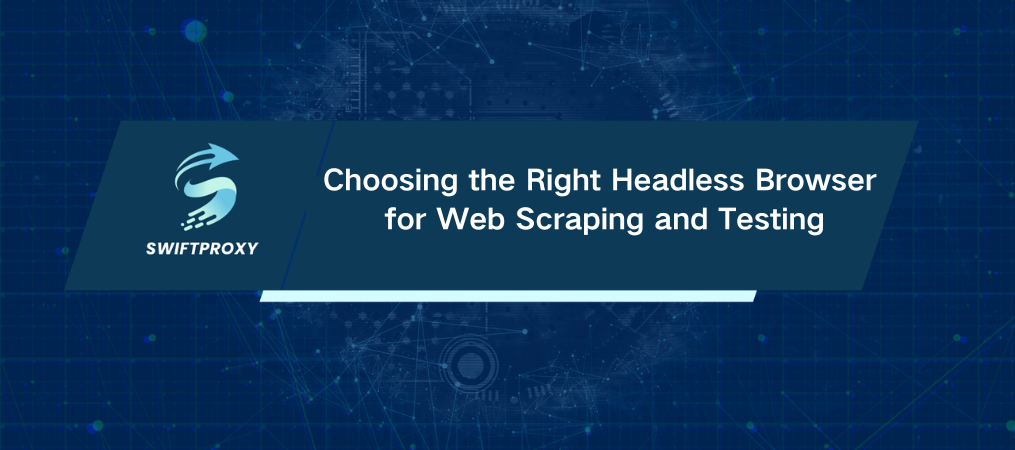Choosing the Right Headless Browser for Web Scraping and Testing

A headless browser is a browser that operates without a graphical user interface (GUI), performing web browsing tasks in the background. Unlike traditional browsers, it focuses solely on functionality, making it faster and more efficient for tasks like web scraping and automation.
Why Choose a Headless Browser
Traditional browsers can be resource-intensive, handling visual rendering and graphics that slow down automation. Headless browsers streamline the process by eliminating these steps, offering a more efficient solution for app testing or data scraping.
Using a Headless Browser for Testing and Scraping
Headless browsers can access websites but require automation tools to perform tasks. These tools programmatically control the browser, simulating actions like clicking, scrolling, and form filling, enabling precise and efficient automation.
Factors to Consider When Choosing a Tool
When selecting a headless browser tool, consider:
Pros and Cons: Understand strengths and weaknesses.
Programming Languages: Ensure compatibility with your preferred language.
Supported Browsers: Verify browser compatibility.
GitHub Stars: Reflects community support and activity.
Latest Release: Indicates active maintenance.
Repository Access: Good documentation and code accessibility simplify usage.
Top Headless Browser Libraries
Here are eight popular options:
1. Playwright
Playwright is a modern automation tool developed by Microsoft. It supports Chromium, Firefox, and WebKit, allowing for cross-browser testing and scraping.
Pros: Fast, reliable, supports debugging, and automatic waits.
Cons: Requires many dependencies.
Languages: JavaScript, Python, C#, Java.
Browsers: Chrome, Edge, Firefox, Safari.
GitHub Stars: 60.3k.
2. Selenium
Selenium is one of the oldest and most widely used browser automation frameworks. It supports a wide range of browsers and programming languages but lacks some advanced features.
Pros: Well-documented and actively maintained.
Cons: Slower and lacks automatic waits.
Languages: Java, Python, JavaScript, Ruby.
Browsers: Chrome, Edge, Firefox, Safari.
GitHub Stars: 29k.
3. Puppeteer
Puppeteer is a Node.js library that primarily controls Chrome and Chromium browsers. It offers an intuitive API and is particularly useful for scraping and rendering pages.
Pros: Easy-to-use API, supports screenshots and PDFs.
Cons: Limited to JavaScript and lacks WebKit support.
Languages: JavaScript.
Browsers: Chrome, Chromium, Firefox (experimental).
GitHub Stars: 86.4k.
4. Cypress
Cypress is designed for testing modern web applications. While it’s excellent for end-to-end testing, it's not ideal for scraping tasks.
Pros: Rich testing features with automatic waits.
Cons: Limited scraping and cross-browser capabilities.
Languages: JavaScript.
Browsers: Chrome, Edge, Firefox.
GitHub Stars: 45.9k.
5. chromedp
chromedp is a Go-based library that allows you to automate Chrome browsers. It offers efficient resource handling and powerful scraping capabilities.
Pros: Efficient, supports CSS selectors, and screenshots.
Cons: Limited to Chrome with fewer testing features.
Languages: Go.
Browsers: Chrome.
GitHub Stars: 10.2k.
6. Splash
Splash is a lightweight browser focused on JavaScript rendering. It integrates well with Scrapy and supports custom interaction logic through Lua scripts.
Pros: Integrates well with Scrapy, supports parallel processing.
Cons: Limited browser support and slower updates.
Languages: Python.
Browsers: Custom JavaScript engine.
GitHub Stars: 4k.
7. Headless Chrome
Headless Chrome is a Rust-based library that controls Chrome browsers. It provides basic browser automation but lacks some features found in more popular tools like Puppeteer.
Pros: Supports screenshots, PDFs, and network request interception.
Cons: Basic features and limited browser support.
Languages: Rust.
Browsers: Chrome, Chromium.
GitHub Stars: 2k.
8. HTMLUnit
HTMLUnit is a Java-based library that simulates browser interactions. It's particularly useful for older web technologies but lacks modern capabilities.
Pros: Good documentation and AJAX support.
Cons: Lacks modern features.
Languages: Java.
Browsers: Chrome, Firefox, Internet Explorer.
GitHub Stars: 806.
Conclusion
Choosing the right headless browser tool depends on your project's needs. Consider the programming language you're using, the browsers you need to support, and whether the tool meets your requirements for automation or testing.
If you're working on scraping tasks and facing challenges like CAPTCHA or IP bans, Swiftproxy provides an effective solution. It integrates with tools like Puppeteer and allows you to bypass common web scraping roadblocks.
For more assistance in selecting the right tool or to get started with Swiftproxy, reach out to our team.

















































